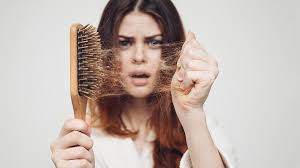
Breastfeeding and Hair Loss
Recently, a mother contacted us in our consultation channel because she was worried that she would be going bald. She was losing a lot of hair every day, and her hairdresser explained to her. that this was what happened to all breastfeeding mothers, that breastfeeding depleted the vitamins in the mother’s body and that this caused her hair problem.
Apparently, breastfeeding seems to cause devastating hair loss during the baby’s first months, and mothers must take multivitamin supplements to reduce this disaster. But although it is true that in the first months after birth, there will occur significant hair loss, we would like to clarify why this occurs.
Is it really the fault of breastfeeding?
No, breastfeeding is not to blame for hair loss.

In fact, these are the phases of normal hair growth, which occurs in three cycles:
- The anagenesis or growth phase: the cells of the hair bulb actively divide and produce hair growth. This phase lasts from two to six years. In general, approximately 85 to 90 percent of all hair on the scalp is in this phase.
- The catagen or transition phase: the hair stops growing, and the lower part of the follicle involves for a period of two to three weeks.
- The telogenic or resting phase: the hair does not grow and is loose until it finally detaches. The telogen phase lasts three to four months.
During pregnancy, the scalp is in the first phase. The hair looks spectacular, but after giving birth, which is some sort of shock to the system, comes the moment of fall, which occurs all at once, called “telogen effluvium”.
This is a process not determined by the method of feeding the baby. Luckily, after a few months, usually between 6 and 15 months, everything eventually returns to normal, and the fall stops.
Is there anything I can do?
One option is waiting for it to pass. If you want to buy anti-hair-loss shampoos or vitamins, they are usually expensive but compatible with and safe during breastfeeding. On the internet you will also find natural treatments to reduce or prevent hair loss, but they usually have no evidence of their effectiveness and are not always compatible with breastfeeding.
Whenever you have questions or are in doubt about the compatibility of a product or medication with breastfeeding, you can look it up on the renowned website www.e-lactancia.org which was created by the association of pediatricians APILAM.
Do you have any other questions?
You can find more information about breastfeeding in our free app, LactApp for iPhone or Android. In the contact section of the app, you can find an in-app consultation channel where our experts will answer your questions.